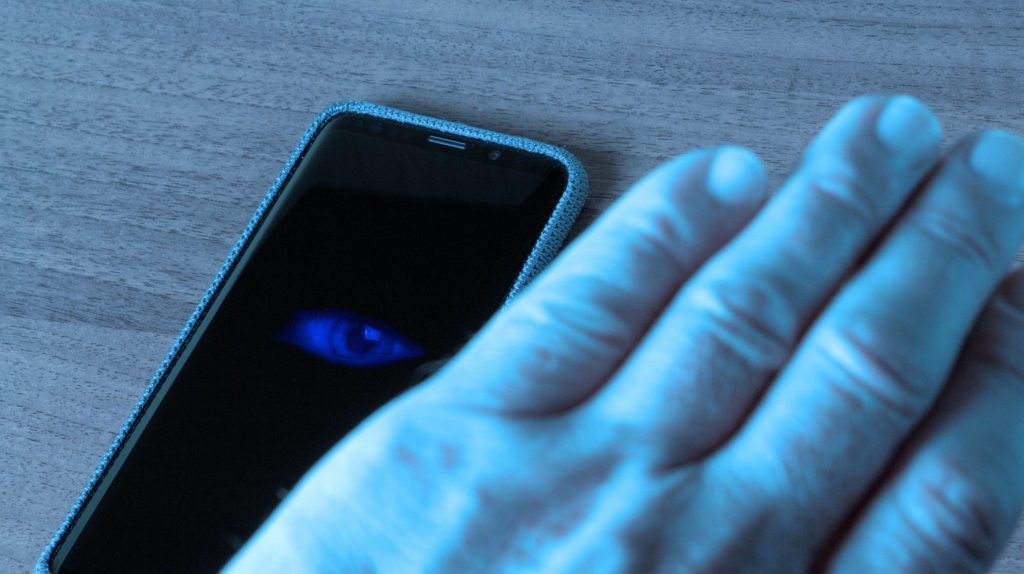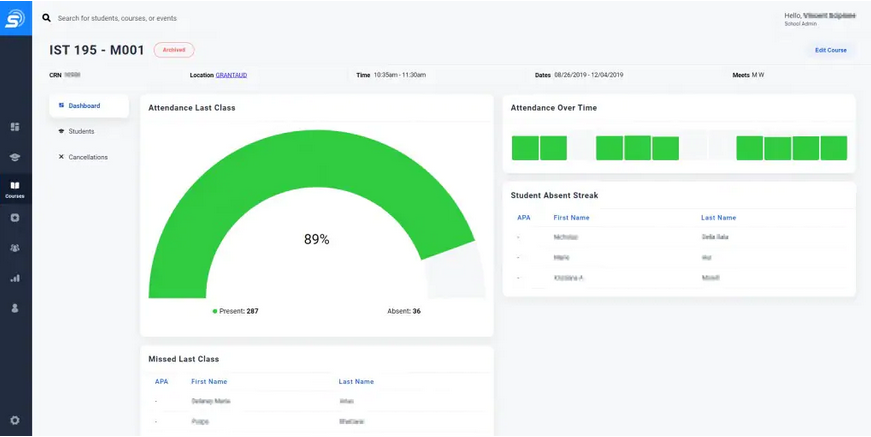 By Tyler Durden
By Tyler Durden
“Graduates will be well prepared … to embrace 24/7 government tracking and social credit systems.”
An app created to track the attendance of ‘less academically inclined’ college athletes is under fire, after over 40 schools have begun using the technology to monitor students campus-wide, according to the Washington Post.
Developed by former college basketball coach Rick Carter (who is currently under a restraining order by DePaul University for allegedly threatening the athletic director and head basketball coach), the Chicago-based SpotterEDU app uses Bluetooth beacons to ping a student’s smartphone once they enter a lecture hall. About the size of a deck of cards, they are installed in covert locations on walls and ceilings.
School officials give SpotterEDU the students’ full schedules, and the system can email a professor or adviser automatically if a student skips class or walks in more than two minutes late. The app records a full timeline of the students’ presence so advisers can see whether they left early or stepped out for a break. –Washington Post
Syracuse University IT instructor Jeff Rubin uses the app to encourage his students to attend lectures – awarding “attendance points” to those who show up. Rubin is also notified when students skip classes.
“They want those points,” said Rubin. “They know I’m watching and acting on it. So, behaviorally, they change.”
According to Rubin, his 340-student lecture has never been so full at around 90% attendance.
Double Secret Dystopia
Understandably, not everyone is thrilled with the intrusive new technology, which many argue breaches students’ privacy rights on a massive scale.
“We’re adults. Do we really need to be tracked?” said sophomore Robby Pfeifer, a student at Commonwealth University in Richmond, which recently began using the campus’ WiFi network to track students. “Why is this necessary? How does this benefit us? … And is it just going to keep progressing until we’re micromanaged every second of the day?”
School and company officials, on the other hand, argue that monitoring students is a powerful motivator and will encourage students to adopt habits geared towards success.
“If they know more about where students are going, they argue, they can intervene before problems arise,” according to the Post.
That said, some schools have taken things further – assigning “risk scores” to students based on factors such as whether they are going to the library enough.
The dream of some administrators is a university where every student is a model student, adhering to disciplined patterns of behavior that are intimately quantified, surveilled and analyzed.
But some educators say this move toward heightened educational vigilance threatens to undermine students’ independence and prevents them from pursuing interests beyond the classroom because they feel they might be watched.
“These administrators have made a justification for surveilling a student population because it serves their interests, in terms of the scholarships that come out of their budget, the reputation of their programs, the statistics for the school,” said Kyle M. L. Jones, an Indiana University assistant professor who researches student privacy.
“What’s to say that the institution doesn’t change their eye of surveillance and start focusing on minority populations, or anyone else?” he added. Students “should have all the rights, responsibilities and privileges that an adult has. So why do we treat them so differently?” –Washington Post
“It embodies a very cynical view of education — that it’s something we need to enforce on students, almost against their will,” said UCSD digital scholarship librarian Erin Rose Glass. “We’re reinforcing this sense of powerlessness … when we could be asking harder questions, like: Why are we creating institutions where students don’t want to show up?”
Hilariously, creators of the dystopian surveillance app have tried to make things ‘more fun,’ by ‘gamifying students’ schedules with colorful Bitmoji or digital multiday streaks.’
That said, “the real value may be for school officials, who Carter said can split students into groups, such as “students of color” or “out-of-state students,” for further review.”
When asked why an official would want to segregate out data on students of color, Carter said many colleges already do so, looking for patterns in academic retention and performance, adding that it “can provide important data for retention. Even the first few months of recorded data on class attendance and performance can help predict how likely a group of students is to” stay enrolled.
Students’ attendance and tardiness are scored into a point system that some professors use for grading, Carter said, and schools can use the data to “take action” against truant students, such as grabbing back scholarship funds. –Washington Post
Meanwhile, another app from Austin-based start-up Degree Analytics uses WiFi check-ins to track around 200,000 students across 19 state universities, private colleges and other schools, according to the Post.
Founded in 2017 by data scientist Aaron Benz, the company claims that every student can graduate with “a proper environment and perhaps a few nudges along the way.”
According to Benz, his system can solve “a real lack of understanding about the student experience” by using campus WiFi data to measure and analyze 98% of students.
But the company also claims to see much more than just attendance. By logging the time a student spends in different parts of the campus, Benz said, his team has found a way to identify signs of personal anguish: A student avoiding the cafeteria might suffer from food insecurity or an eating disorder; a student skipping class might be grievously depressed. The data isn’t conclusive, Benz said, but it can “shine a light on where people can investigate, so students don’t slip through the cracks.”
To help find these students, he said, his team designed algorithms to look for patterns in a student’s “behavioral state” and automatically flag when their habits change. He calls it scaffolding — a temporary support used to build up a student, removed when they can stand on their own.
At a Silicon Valley summit in April, Benz outlined a recent real-life case: that of Student ID 106033, a depressed and “extremely isolated” student he called Sasha whom the system had flagged as “highly at-risk” because she only left her dorm to eat. “At every school, there are lots of Sashas,” he said. “And the bigger you are, the more Sashas that you have.” –Washington Post
Read the rest of the report here.
This article was sourced from Zerohedge.com
Image credit: Collective Evolution
Subscribe to Activist Post for truth, peace, and freedom news. Become an Activist Post Patron for as little as $1 per month at Patreon. Follow us on SoMee, Flote, Minds, Twitter, and Steemit.
Provide, Protect and Profit from what’s coming! Get a free issue of Counter Markets today.


Be the first to comment on "Colleges Track Hundreds Of Thousands Of Students Using Their Phones"